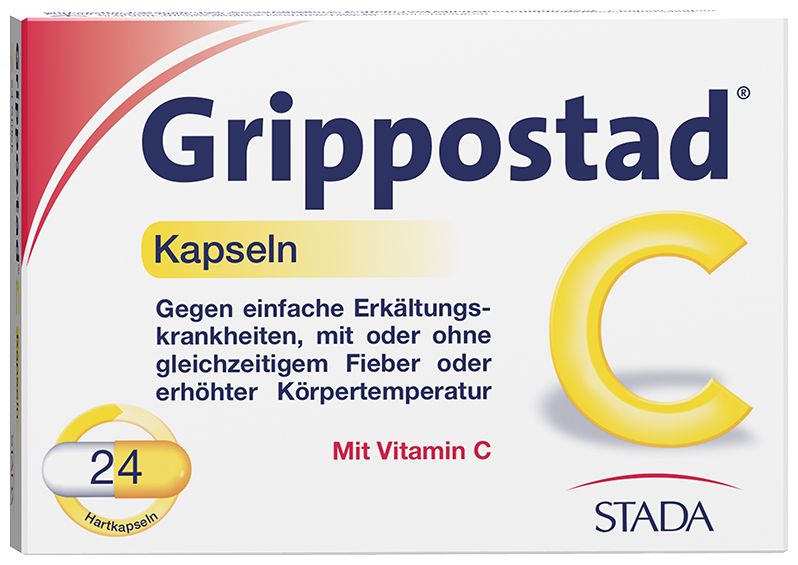Grana
Grippostad C 24 capsules
Grippostad C 24 capsules
5.0 / 5.0
(1) 1 total reviews
Couldn't load pickup availability
Grippostad® C is a medicine against common colds. It contains paracetamol, ascorbic acid, caffeine and chlorphenamine maleate as active ingredients.
Paracetamol is a pain reliever and fever reducer.
Chlorphenamine maleate belongs to the group of antihistamines, supports the decongestion of the nasal mucosa and the reduction of mucus production and thus promotes unhindered nasal breathing.
Caffeine has a slightly stimulating effect and increases the pain-relieving effect of paracetamol. It thus enables a reduction in the paracetamol dose, which means that the body is burdened with lower amounts of painkillers.
Vitamin C (ascorbic acid) supports the immune system and increases the immune system.
Grippostad® C is used for the symptomatic treatment of symptoms that occur together, such as headaches and body aches, runny nose and dry cough as part of a simple cold. If you have a fever or high body temperature, Grippostad® C has an antipyretic effect. Due to the fixed combination of the active ingredients in Grippostad® C, no individual dose adjustment can be made for complaints that predominantly relate to one of the symptoms mentioned. In such situations, drugs of a different composition are preferable.
Contraindications
Grippostad® C must NOT be taken
- if you are allergic to paracetamol, ascorbic acid, caffeine, chlorphenamine maleate or any of the other ingredients of this medicine (listed in section 6).
- if you suffer from hereditary “glucose-6-phosphate dehydrogenase deficiency” (an inherited metabolic disease).
- if you suffer from severe kidney dysfunction
- if you suffer from severe liver impairment
- if you suffer from increased pressure in the eye (narrow-angle glaucoma).
- in prostate adenoma with residual urine formation
- if you have a tumor of the adrenal medulla
- if you are taking an antibiotic with the active substance chloramphenicol at the same time (see section 2: “Taking Grippostad® C with other medicines”)
- in case of excessive or regular consumption of alcohol
- if you suffer from cardiac arrhythmias
- if you have gastrointestinal ulcers
- by children under the age of 12
- if you are pregnant
- if you are breastfeeding
interactions
Interactions of the active ingredients contained in Grippostad® C are possible with:
- Medicines that slow down the emptying of the stomach (e.g. propantheline). Such medicines can delay the absorption of paracetamol into the body and cause Grippostad® C to take effect more slowly.
- Medicines that increase gastric emptying (e.g. metoclopramide). These medicines can accelerate the absorption of paracetamol into the body and cause Grippostad® C to take effect more quickly.
- AZT (zidovudine, medicine used to treat HIV infection). The tendency to develop neutropenia (decrease in white blood cells) is increased. Grippostad® C should therefore only be used concomitantly with AZT on medical advice
- probenecid (medicine for gout). If you are taking probenecid at the same time, your doctor may reduce the dose of Grippostad® C, as the breakdown of Grippostad® C in the body may be slower.
- salicylamides (painkillers). The degradation of Grippostad® C may be prolonged if salicylamides are used at the same time.
- Medicines that activate certain metabolic enzymes in the liver that are involved in breaking down medicines in the body. These include, for example, certain sleeping pills (barbiturates), medicines to treat epilepsy (phenytoin, carbamazepine) or medicines to treat tuberculosis (rifampicin). Simultaneous use of these medicines can increase the liver-damaging effect of Grippostad® C.
- The simultaneous consumption of alcohol also increases the liver-damaging effect of Grippostad® C.
- Chloramphenicol (an antibiotic): the combination with Grippostad C increases the harmful effect due to slower elimination.
- Medicines to prevent blood clotting (anticoagulants). Repeated intake of Grippostad® C for more than a week can increase the effect of anticoagulant drugs.
- cholestyramine (medicines used to lower high levels of fat in the blood). Concomitant use with cholestyramine may reduce the absorption and effectiveness of Grippostad® C.
- Medicines that promote sleep, such as sleeping pills (barbiturates), medicines to treat allergies (antihistamines), or medicines to treat mental illnesses (psychotropics) and/or alcohol. When used at the same time, the sleep-inducing effect of these drugs can be increased by Grippostad® C.
- Medicines that increase heart rate, such as sympathomimetics (medicines that increase blood pressure) and thyroid hormones (thyroxine). The heart rate-increasing effect of these medicines may be increased when used concomitantly with Grippostad® C.
- theophylline (medicine used to treat bronchial asthma). The excretion of theophylline from the body may be reduced when used at the same time as Grippostad® C and the effect of theophylline may be increased.
- Ephedrine and related substances (eg in some cold and hay fever medicines). Simultaneous use with Grippostad® C increases the risk of possible undesirable interactions and should therefore not be used at the same time.
- Drugs with a broad spectrum of action, such as benzodiazepines (sleeping and sedatives). When combined with Grippostad® C, different and unforeseeable interactions can occur. If you notice any interactions when taking such medicines at the same time, please inform your doctor immediately.
- certain antibiotics (quinolonecarboxylic acid-type gyrase inhibitors). These medicines can delay the elimination of Grippostad® C from the body.
- other painkillers: the effect may be increased.
- Grippostad® C can increase the absorption of iron and aluminum from the digestive tract. This is particularly important in patients with impaired kidney function, when taking iron supplements and antacids containing aluminum (agents for neutralizing gastric acid).
- Grippostad® C reduces the effect of anticoagulants such as warfarin.
Taking Grippostad® C with food, drink and alcohol
Grippostad® C must not be taken with alcohol, as alcohol can affect the effects and side effects (especially liver damage) of Grippostad® C.
Pregnancy and breast-feeding
If you are pregnant or breast-feeding, think you may be pregnant or are planning to have a baby, ask your doctor or pharmacist for advice before taking this medicine.
Pregnancy
If you are pregnant, you must not take Grippostad® C.
Breast- feeding
If you are breast-feeding, you must not take Grippostad® C, as the components of Grippostad® C can pass into breast milk.
Grippostad® C contains lactose (milk sugar)
. Please consult your doctor before taking Grippostad® C if you know that you suffer from an intolerance to certain sugars.
application
Always take this medicine exactly as described in this leaflet or as your doctor or pharmacist has told you. Check with your doctor or pharmacist if you are not sure.
The recommended dose is:
Adults and young people aged 12 and over
- 2 capsules 3 times a day
Patients with impaired liver and/or kidney function
In patients with liver and/or kidney dysfunction and congenital increased bilirubin levels in the blood due to a rare liver disease (“Gilbert syndrome” or “Meulengracht disease”), the dose must be reduced or the dose interval extended will. Please speak to your doctor about this.
If you have severely impaired liver and/or kidney function, you must not take Grippostad® C (see under 2. Grippostad® C must NOT be taken).
Elderly
No specific dose adjustment is required.
Method of
administration Take the capsule with sufficient non-alcoholic liquid (eg 1 glass of water).
Duration of use
Grippostad® C should not be taken for longer than 3 days without medical advice.
Please talk to your doctor or pharmacist if you have the impression that the effect of Grippostad® C is too strong or too weak.
side effects
What side effects are possible?
Like all medicines, this medicine can cause side effects, although not everybody gets them. When assessing side effects, the following frequency information is usually used as a basis:
Very common: affects more than 1 user in 10
Common: affects 1 to 10
users in 100
Uncommon: affects 1 to 10 users in 1,000
Rare: affects 1 to 10 users in 10,000
Very rare: affects less than 1 user in 10,000
Not known: Frequency cannot be estimated from the available data
Blood and lymphatic system disorders
Very rare: Changes in the blood picture such as reduction in white blood cells, reduced number of blood platelets and the resulting punctiform to small patchy skin bleeding, reduction in the number of all blood cells, reduced blood cell formation in the bone marrow and, with high doses, altered blood pigments (can be lead to a lack of oxygen in the tissue).
Immune system disorders
Very rare: Severe hypersensitivity reactions (ranging from simple reddening of the skin to wheals, swelling of the skin and mucous membranes, shortness of breath, sweating, nausea, drop in blood pressure to circulatory failure and shock) have been described for the active ingredient paracetamol (a component of Grippostad® C). been.
Metabolism and nutrition disorders
Very rare: increased appetite
Psychiatric disorders
Very rare: psychotic reactions
Frequency not known: restlessness, insomnia
Nervous system disorders
Very rare: involuntary movements
Frequency not known: tiredness, drowsiness
Eye disorders
Very rare: triggering of glaucoma (narrow-angle glaucoma; eye disease with increased intraocular pressure), visual disturbances
Cardiac disorders Frequency not known: irregular heartbeat, such as rapid heartbeat
Respiratory and thoracic disorders
Very rare: Hypersensitivity reactions affecting the respiratory tract. Grippostad® C can trigger a spasm of the respiratory muscles (bronchospasm) in people who have already been exposed to stress.
Gastrointestinal disorders
Common: dry mouth
Very rare: gastrointestinal disorders
Liver and gallbladder disorders
Rare: Increase in liver values
. Very rare: Liver damage can occur after long-term use of high doses or in the event of an overdose.
Skin and subcutaneous tissue disorders
Uncommon: Allergic skin reactions (simple skin rash or hives), possibly accompanied by a rise in temperature (drug fever) and damage to the mucous membranes
. Very rare: Serious skin reactions with blistering (Steven-Johnson syndrome, toxic epidermal necrolysis = Lyell's syndrome, acute generalized pustular exanthema)
Kidney and urinary tract disorders
Rare: taking high doses of Grippostad® C can lead to diarrhea and an increased urge to urinate
Very rare: difficulty urinating, prolonged use of higher doses can lead to kidney damage
In patients with kidney damage or existing kidney stones from oxalate increases the risk of oxalate stone formation.
Tests
Frequency not known: Grippostad® C can interfere with certain laboratory tests for determining uric acid and blood sugar.
Grippostad® C may affect some laboratory values. Ascorbic acid (vitamin C) (a component of Grippostad® C) can interfere with the measurement of various laboratory values (e.g. glucose, uric acid, creatinine, inorganic phosphate, occult blood in the stool) when taken in high doses.
Grippostad® C reduces the reaction of skin allergy tests. Grippostad® C should therefore be discontinued 4 days before the test is carried out.
Please ask your doctor before laboratory tests.
Significant side effects or signs to look out for and what to do if you are affected
In the event of an allergic shock reaction, seek medical help immediately.
composition
The active ingredients are: paracetamol, ascorbic acid (vitamin C), caffeine and chlorphenamine maleate.
1 capsule contains 200 mg paracetamol, 150 mg ascorbic acid, 25 mg caffeine and 2.5 mg chlorphenamine maleate.
Share


